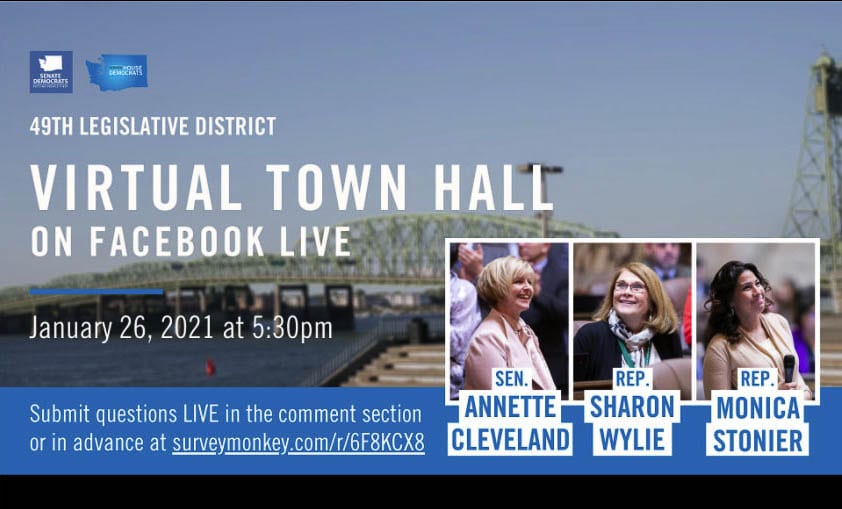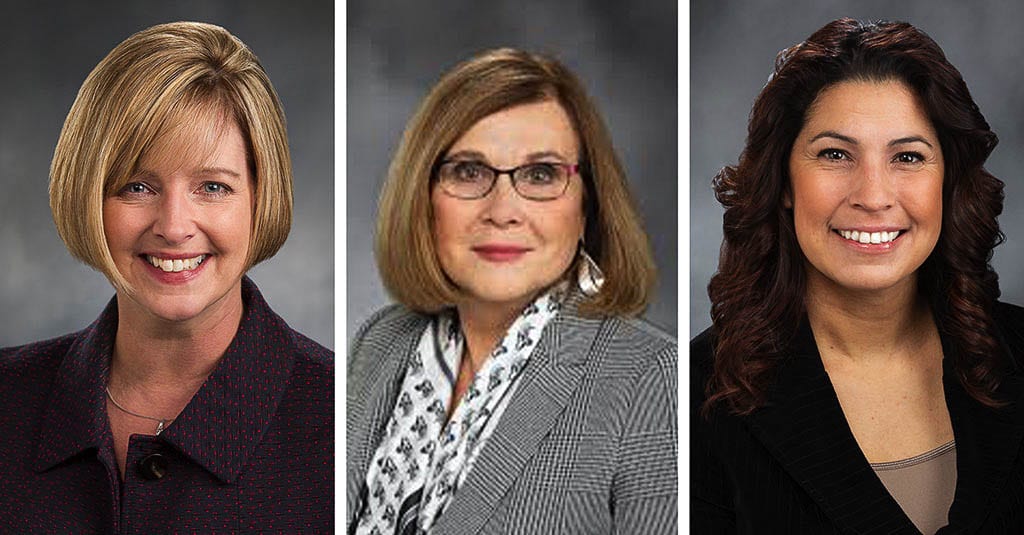New taxes for transportation and healthcare part of town hall discussion
The three elected representatives of the 49th Legislative District held a virtual town hall on Tuesday evening, via Facebook. Numerous topics were addressed, as citizens submitted questions via email, via survey monkey, and also online during the live event.
Technical issues marred the start of the town hall, but for the most part the legislators were able to share their opening remarks, and then move on to constituent questions. A moderator asked questions that had been submitted in advance. People could also submit questions via a chat feature.
A broad range of topics were covered. Questions focused on the pandemic relief, deploying the vaccine, providing healthcare, eviction protections, opening up schools and a host of government programs to help people. The Interstate Bridge and the carbon tax also were touched on a couple times, as well as traffic congestion relief.
“We fully recognize that people are struggling; they need relief, they need help,” said Sen. Annette Cleveland. “We have to prepare for what we know will be a very much increased need not just for economic help, but for additional health care for mental health services, or help with housing, and food. The list is endless.”
She also spoke of efforts to get vaccines into the arms of citizens, plus the need for contact tracing and testing. Cleveland mentioned the need to streamline pandemic response, and also help to put more resources in place for people to access personal protective equipment. “So I think I would answer the question by saying, what aren’t we doing.”
Rep. Monica Stonier said she’s “working toward ensuring that kids and educators have a safe return to school as one of the major steps back to normalcy. But of course, we want to make sure that we do that in a way that is safe.”
Stonier mentioned that the appropriations committee is hoping to get money to schools very quickly, possibly by mid February. They want to cover the funds that schools have lost due to a decline in student enrollment.
A constituent asked what the legislature was doing to help children make up ground for the learning they have lost due to the pandemic and schools being shut down.
“We will be sending federal relief dollars to schools, asking districts to focus on what we need to be doing down the road as well for learning loss,” said Stonier. She said they may decide to deploy more funds from the state level. “We’re going to really want to focus on how we can help students make up ground.”

The legislators mentioned tenant protections, so that people cannot be evicted from their homes in the middle of the pandemic. Landlords were also being considered for some form of relief, since some tenants were not paying rents.
Sen. Cleveland responded to a specific question about Senate Bill 5204. It is one of several bills that pertain to universal health care and single payer health care. “Even in the midst of this pandemic and the ongoing public health emergency, there is continued focus on advancing the single payer discussion,” she said.
Cleveland also reminded constituents that “in 2019, as a state, we were the very first in the nation to pass a public option, health care coverage that is more affordable. It’s our first government sponsored insurance coverage in the United States.”
The legislature is also considering a healthcare premium subsidy program according to Cleveland. It’s part of her efforts to move towards universal healthcare coverage.
“Over 50 percent of our citizens have healthcare through their employers,” she said “We need to carefully plan and address what should be done about these private insurance plans.
“We need to particularly determine the impacts to our union members, who have collectively bargained for their health care,” she said. “They gave up other benefits to ensure that they had strong health care coverage.”
Cleveland wants to make sure that union members don’t lose the robust health care coverage that they have worked very hard for. She also mentioned the costs. “There will be necessary tax increases and upfront costs in order to try to implement something like Senate Bill 5204.”
The conversation turned to transportation. A constituent asked “Will we get a new I-5 bridge before our old bridges fall?”
Rep. Sharon Wylie responded by mentioning the huge amount of time spent over the last six or seven years to ensure that we get a new bridge. “As long as we don’t have the big earthquake, before we get done, I’m confident that we’re not wasting our time,” she said.

Constituent Adam asked: “How much of our transportation budget will go to relieving traffic congestion?”
Wylie responded, saying she would have to get back with a specific answer. She referenced how the legislature likes to allow local communities to set their priorities. She mentioned a roundabout was chosen as a cheaper alternative in the Camas-Washougal community, because the local government didn’t have funds, and didn’t want to wait for state money for a more expensive bridge over SR-14.
Wylie wants to make sure there is a balanced system, where freight can move, where people can use public transportation.”It’s not easy,” she said. “We have so many more cars and people than we had when most of our infrastructure was built during the 50s.”
The legislators were asked if they support the clean fuels standards, specifically HB 1091.
Stonier said she is a supporter of the bill. “We know that the climate crisis that we are facing has been described many times as the existential crisis of our time.”
Stonier noted that there are several other climate related policies and proposals floating around the legislature this year. The legislators expect a very extensive conversation on the topic.
“Our transportation package has a very robust carbon fee,” said Wylie. “We found that the carbon fee gives us money to invest in critical infrastructure, so that we can make the move to cleaner transportation.
“Transportation is the area where we have the most to do and have the least,” she said. “So there’s going to be a lot of attention paid to it.” Wylie is very optimistic. She was surprised at how much support there was for a carbon fee and investing in cleaner infrastructure, during a statewide tour.
“The cost of raising the price on carbon and gasoline for that matter is a popular and easy way to raise money for our transportation,” Wylie said. “We’re trying not to go back to the license plate” (car tab fee).
Another topic included a gun ban. Specifically mentioned was “intimidation” because people were allowed to open-carry a weapon at the state capital.
Stonier responded saying both chambers are working to pass legislation that would “outlaw the intimidation that comes with the intent of some people who are showing up with their weapons.” She supports the Second Amendment, but she does not appreciate or welcome intimidation that comes along with people who show up at these protests with weapons displayed.
“The intimidation that we have seen will be unwelcome both at the Capitol building and yes, across the state, should we be successful in passing that legislation this year,” Stonier said.
Other topics included police accountability and the use of deadly force. One constituent asked about the lack of childcare. Another asked about lead contamination in our school’s water. They were also asked about allowing the state to sell online voter information.
Each legislator offered closing remarks. Cleveland highlighted the effort to replace the Interstate Bridge and supporting a transportation revenue package from Sen. Steve Hobbs. (See current proposal in the House here.) She also mentioned investments in broadband and public works. But the main focus is on COVID-19 and the pandemic.
Stonier talked about people’s mental health and understanding people’s need to get back to normal. She mentioned the use of remote testimony for the legislature, and that many continue even after the pandemic to improve the people’s accessibility to their representatives.
Citizens were encouraged to continue communicating with their elected representatives via emails, phone calls to their legislature offices, or via social media platforms.




